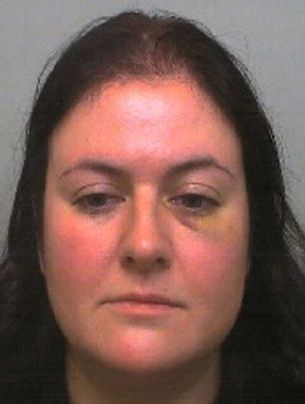


Some anti-rape activists believe evil women should be given a free pass to falsely accuse men. They are sorely wrong.

Rape liar Rhiannon Brooker
This month the tragic case of a young woman’s suicide made the news in the UK; for legal reasons, the full facts are somewhat vague, but 23 year old Eleanor de Freitas died in April. Last year she accused a man of raping her before Christmas 2012; the case was investigated, but dropped. Then the man she had accused decided to bring a private prosecution. This was taken over by the CPS, who continued with it. It was this that is said to have driven her to take her own life.
A great deal has been made about her so-called vulnerability; she had been diagnosed with bipolar disorder. And this means she should not have been prosecuted because?
Bipolar disorder used to be called manic depression; like regular depression it is not a mental illness, rather it is a state of mind, states of mind in this case. The suggestion that people who “suffer” from this condition should not be held accountable for their actions is somewhat novel. Should a woman who has been diagnosed with kleptomania not be prosecuted for shoplifting? Should a man who has been diagnosed with a severe personality disorder (whatever one understands by that) not be prosecuted for rape, grievous bodily harm or even murder?
Very sensibly the law acknowledges that sometimes people warrant special treatment. The Infanticide Act recognises that very occasionally a new mother will kill her child when the balance of her mind has been disturbed. There is a special provision known as doli incapax which exculpates the very young from prosecution in even very serious cases, while those who are barely of an age when they can be prosecuted are generally handled with kid gloves, as were Thompson and Venables, but simply claiming to have or actually being diagnosed with a mental abberation should not be a free pass for wickedness.
Returning to the case at hand, the man Miss de Freitas accused was 12 years or so her senior, and the two appeared to have been in a relationship. He has been identified as Alexander Economou, a wealthy man who appears to have spent a considerable sum on bringing this prosecution. She had accused him not simply of raping her but of drugging her first. Most men accused of rape would not be in a position to bring a private prosecution, but if Mr Economou felt he needed to clear his name totally, why should he not have? He is said to have gone to considerable lengths to do so, including collecting details of phone calls and CCTV footage. He must have been extremely confident, because bringing such a prosecution is a double edged sword. If she had been acquitted, she could have broadcast to the world the claim that he had raped her, and he would have had no further legal redress.
Reading between the lines, this appears to have been a relationship that ended on a sour note. While we should sympathise with the family of Miss de Freitas, who is to blame for her suicide?
Anti-rape activists – so-called – make all manner of excuses for women who accuse men falsely of rape, but can there be any? Sometimes there can be a genuine misunderstanding, this may be what happened in the Ched Evans case, sordid though it was. A woman who gets so drunk that she cannot remember having sex with one man or two, voluntarily or not, is a menace to both herself and to any man with whom she hangs out. It was once widely believed that young women were targeted by sexual predators who spiked their drinks. A study commissioned by the Association of Chief Police Officers revealed otherwise. It is now accepted that such cases are few and far between, and that as far as a date rape drug exists, it is self-administered alcohol.
If Miss de Freitas believed she had been drugged and raped, she should have reported it reasonably promptly. We are now well into the 21st Century, and an intelligent, educated woman, such as she was, knows and understands full well that with modern forensic techniques, a genuine rape reported under such circumstances would most likely result in a conviction. Unless there are special circumstances, there is absolutely no excuse for a woman to delay reporting any sexual assault, and clearly there were no special circumstances here. A report delayed for weeks, months, years and in some cases decades suggests one thing and one thing only, there was no credible evidence of rape and she knew it, but maybe she will get lucky and the jury will believe her, and if they don’t, she has tarred this guy forever with the brush of no smoke without fire. Any woman he dates in future will have in the back of her mind the knowledge that he was once accused of rape.
Under the circumstances, no reasonable person can blame Mr Economou for bringing a private prosecution, and no one should blame the CPS for continuing it. To do otherwise sends entirely the wrong message; if rape is a serious crime, then wilfully crying rape is likewise a serious crime, and in the absence of special circumstances should be prosecuted to the full extent of the law.
Needless to say, not everyone agrees, but it is essential to draw a sharp line between on the one hand advocating for genuine victims of sexual abuse, and on the other engaging in dishonest apologetics for false accusers and shameless liars.
Although the cases are poles apart, another alleged rape victim committed suicide in January last year apparently because of the distress caused by testifying against her abuser. Michael Brewer had been a distinguished music teacher who had worked briefly at Chetham’s School of Music. He stood trial charged with historic sex offences against Francis Andrade, whom he was said to have indecently assaulted between 1978 and 1982, and to have raped her when she was 18. He was forced to resign after having what has been called an inappropriate relationship with a 17 year old in the 1990s. This suggests that her story may have been true, but certain aspects of it are difficult to credit, namely that Brewer’s wife also indecently assaulted her.
Although Brewer was convicted on the indecent assault charges, he was cleared of the major charge. Francis Andrade committed suicide while the jury was out. To anti-rape activists this suggests the terrible strain of reliving the ordeal, but another and far more likely explanation is that like Eleanor de Freitas she had serious mental health issues; normal women do not normally kill themselves over thirty year old memories, however unpleasant.
And, a point made by the blogger Anna Raccoon – in relation to the former though not the latter – committing suicide before a court case is a sign of guilt in a male ‘predator’, but a ‘regrettable and avoidable’ tragedy where a ‘vulnerable female’ should have been in the dock. This was the case with for example Simon Wood. Might he not have been innocent in spite of his previous history?
Whether or not Brewer did indecently assault Francis Andrade, he was caught up in a police trawl, one which has not finished yet. Though he was cleared of the rape charge, this does not mean he did not rape Francis Andrade, but it seems unlikely, even if there can be little doubt she believed he had. This and other evidence from unrelated cases raises the question does the CPS – contrary to the propaganda of Women Against Rape – bring too many rape cases rather than too few?
The case of Rhiannon Brooker is qualitatively different from the de Freitas and Andrade cases, and no one should have any sympathy for her. She is certainly not mentally ill, although she may well be a psychopath because this is one of the most outrageous false rape allegations we have seen in recent years; Brooker set out systematically to frame a totally innocent man in the most grotesque manner possible.
The background to the case can be found here, and here is an interview with the man she accused, Paul Fensome.
How does this gel with the claim by Women Against Rape that “Rhiannon should never have been prosecuted. Serious charges such as perverting the course of justice should not be used on vulnerable women.”
Clearly it does not, here is a woman who faked injuries, who lied over a protracted period of time, and kept an innocent man behind bars for 5 weeks. Had Paul Fensome been convicted, he may have been given a life sentence. In this case, there are really only two explanations: either Rhiannon Brooker was lying or he was. Initially, the police believed her; so compelling was her act that they did not really bother to investigate the case, even to check his cast iron alibi for one of the alleged rapes.
It was clearly only with the greatest reluctance that the police were forced to admit they had been duped by a woman who carried out a calculated act of evil. What planet are these people living on when they call her vulnerable and claim she should not have been prosecuted?
Here is their take on three other cases: “Reporting violence or defending yourself can land you in prison. Gail Sherwood and Layla Ibrahim were attacked by strangers; accused of lying after a biased police investigation they were jailed for two and three years...In the US Charmaine Pfender is serving life for killing her rapist...Campaign with Women Against Rape to end these miscarriages of justice.”
Both Gail Sherwood and Layla Ibrahim were rightly convicted. The case of Charmaine Pfender who was given a life sentence for “killing her rapist” is misleading in the extreme. Charmaine Pfender did not act alone; along with her co-defendant Sara Richardson she shot Turkish student Engin Aydin and buried him in a shallow grave in a remote wooded area. Another student was also shot but survived. Pfender appealed her conviction on the grounds of prejudicial pre-trial publicity; as might be expected, a crime of this nature was sensational because of its rarity as much as of its utter callousness. According to the 1988 appeal judgment: “This was a wanton killing that arouses no signs of mercy from this Court.”
The suggestion that a woman faces automatic prosecution if she accuses a man of rape without him being convicted or at least tried is emotive rubbish, as is the inference that a woman who kills a man who attempts to rape her will feel the full force of the law. While rape is never justified, neither is murder, but in some limited circumstances a woman (or man) is entitled to use lethal force. For example, in 2002, a woman in Albuquerque shot and killed a man who broke into her home intending to rape and possibly murder her. This was ruled a justifiable homicide, and is clearly not comparable with the Pfender/Richardson case.
The reality is that no genuine rape victim need fear reporting her rape, and in the extremely rare instances in which a woman kills or seriously injures an attacker – be he a sexual predator or other – again she need have no fear.
If anti-rape activists – so-called – are intent on reducing the incidence of rape they need to start by being honest, with their narratives as much as with their facts.
To Wikinut Articles Page